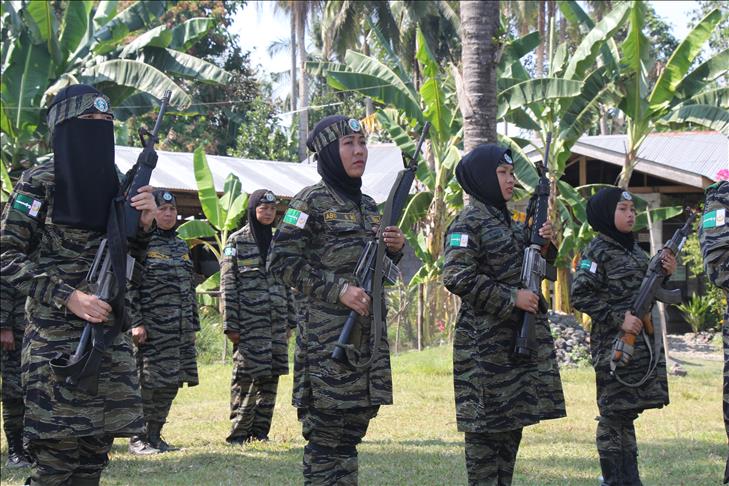Philippine Muslim rebels prepare for new life
AA enters the Philippines’ Muslim rebel camps, days before a peace deal with the government is agreed.

by Turgut Alp Boyraz
COTABATO, The Philippines
Deep in the jungles of the southern Philippines chants of “Allahu Akbar!” (God is the greatest) echo among coconut trees and banana plants.
With the government and the country’s largest rebel group preparing to sign a March 27 peace agreement, expectations among Moro Islamic Liberation Front (MILF) fighters are high.
MILF fighter Al Baker Edris, 23, talking to Anadolu Agency at the group’s Camp near the southern city of Cotobato, says he wants to have a normal life after the signing.
“I am one of the people who want to study in Turkey, as the Turkish government offers a scholarship to the Bangsamoro. I want to have stable work, get married and have a decent future,” he says.
The Bangsamoro are the country’s ethnically indigenous Muslim population, and the name is also that of a proposed autonomous political entity in the south of the Philippines called for by the MILF and rebel groups.
“Our ancestors have sacrificed their blood for more than 40 years for the freedom of Bangsamoro,” he says. "Now, we want to see and feel that the government implements all of the agreements in these negotiations.”
The peace agreement represents the culmination of diplomatic efforts aimed at ending the conflict in Mindanao, the home of the country’s Muslim minority. It aims to bring to a close an insurgency that began in the 1970s and has killed more than 150,000 people, mostly civilians and left large parts of the country’s fertile southern region mired in poverty.
Since the 1970s, the MILF and several other armed groups have supported a rebellion aimed at achieving independence for the country’s prominently Muslimsouth, determined to earn what they term "a better life" for the predominantly Catholic country's Muslimpopulation.
But, in 2011, President Benigno Aquino III and MILF chair Al Haj Murad Ebrahi, agreed to end the conflict in Mindanao within the current administration. As Aquino’s term ends in mid-2016, both sides are rushing to implement the deal.
“We want to be mothers, not fighters”
Among the groups practicing their manoeuvres are a group of women dressed in military uniforms and bearing guns.
Bangsamoro Islamic Women's Auxiliary Brigade (BIWAB) commander Wilma Madato tells AA that they want to be ordinary women rather than fighters.
“I am training those Mujahedeen (a term used forMuslim women fighters) for years. Now we want to have back our privilege as women, to be the mother of our children. We don’t want to expose ourselves to military training anymore. That is my expectation from the peace agreement,” she said.
Madato explains that the 10,000 female fighters have not been involved in any armed confrontation but are kept as reserve by the Bangsamoro Islamic Armed Forces.
“After the signing of the framework agreement in 2013, we stopped doing hard military training. Our members live in their homes now, instead of the mountains or jungle. We do schooling activities to make sure that our military knowledge won’t be forgotten. We also train our members to handle medicine and such,” she said.
A camp deep in jungle
Another MILF camp – Afghan - is based deep in the jungle, where hundreds of the organization’s fighters have lost their lives.
To reach the camp, one has to walk about an hour through the jungle, crossing several rivers.
In 1999, more than 200 MILF fighters were killed in an air strike by the Philippine army. The commander of the camp, Yusophy Hashim, however, told AA that they are still optimistic about the peace agreement.
“We have fought the Philippine army for so long, paying a heavy price with our lives and blood for the freedom of Bangsamoro. Now, we are very hopeful about the future, and united as a whole behind the present peace deal with the Philippine government,” said Hashim.
Although preparing for a civil life after the agreement, hundreds of MILF members still continue hard military training in the Afghan camp.
Apart from training, the camp also functions as a community center, home to thousands of civilians, women and children spending their days alongside the fighters.
Homes on the water
Grand Rio River, another MILF stronghold, is home to thousands of people. Among the wooden homes on stilts, checkpoints guard the river, inside them around 50 MILF fighters who live with the local people.
One 90-year-old woman, Mariam Sampayan told AA that she has spent all her life in the village, and seven of her sons are MILF fighters.
In 2011, the river overflowed after days of heavy rain, submerging at least 37 villages in Cotabato city, downstream of the MILF checkpoints, displacing some 6,000 families. MILF sent about three thousand people to help rebuild the community.
Decades of armed conflict
The four decades of armed conflict have resulted in the deaths of over 120,000 people, and the displacement of more than two million. Constant evacuations have interrupted children's schooling and hampered farmers' livelihoods.
Manila and MILF want to set up the region as "Bangsamoro" before President Benigno Aquino III steps down in 2016, giving the Muslim-dominated area greater political powers and more control over resources.
The final peace agreement will specify how the wealth of the nation is to be divided and how power will be shared, as well as the pace of decommissioning of the rebels' 12,000-strong army.
Related news:
http://www.aa.com.tr/en/headline/304686--sustainable-peace-takes-time
englishnews@aa.com.tr
Anadolu Agency website contains only a portion of the news stories offered to subscribers in the AA News Broadcasting System (HAS), and in summarized form. Please contact us for subscription options.

